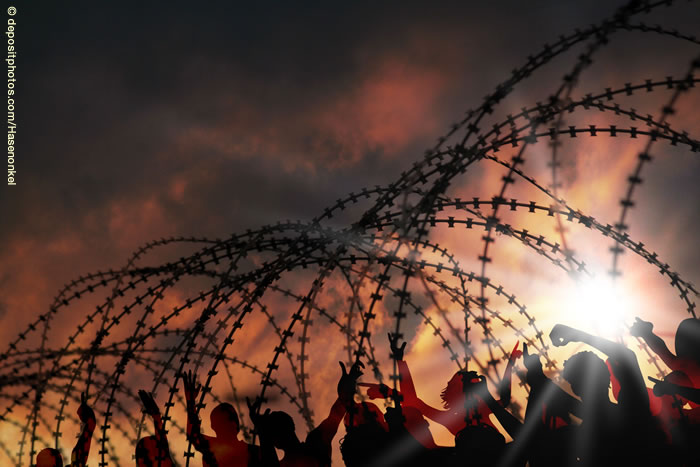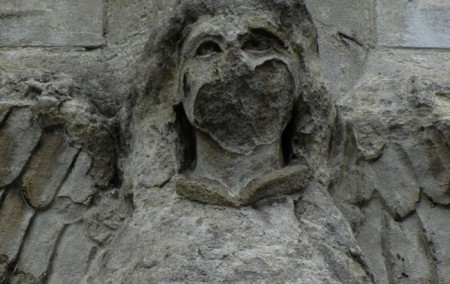The best and worst of what happens when a global church speaks in one voice to help people regardless of their nation or their religious status.
Unity Across the Board
The best part of the refugee crisis is how it has brought together the great diversity of the United Methodist Church.
In response to the Paris terrorist attacks, many American governors and state agencies stated their desire to close their borders to Syrian refugees. In short order, we saw an amazing confluence of statements by the leadership in the United Methodist Church from across the spectrum:
- Bishop McKee (North Texas), Bishop Mueller (Arkansas), Bishop Devadhar (New England), Bishop Dyck (N. Illinois) all publicly opposed the
grandstandingexclusion of Syrian refugees by their regions’ governors. - Bishop Streiff (Central and Southern Europe) urged an open border “without consideration of their religious background.” And Bishop Ough (Dakotas-Minnesota) appealed to “not let fear curtail our hospitality.”
- Bishop Jones (Great Plains) wrote forcefully in support of accepting Syrian refugees and over 30 churches in his region have pledged to accept a Syrian family.
- The General Boards of Church and Society (second statement here) and Global Missions both publicly opposed the closing of the borders.
- UM Missionary and global photographer Paul Jeffrey depicted the plight of the Syrian refugees and urged an open border.
- The UMC president of Asbury Theological Seminary tweeted that they would accept Syrian refugees.
- The UMC president of Church World Service criticized the closing of borders.
- Adam Hamilton, megachurch pastor, wrote a blog post opposing the unequivocal closing of borders.
- 12 members of the New England Conference Board of Church and Society penned an open letter opposing closing their state borders
- Updates 11-23-2015:
- Kentucky Annual Conference published an ecumenical letter of welcome.
- Bishop Huie (Texas) joined a joint letter of welcome.
- Bishop Schnase (Missouri) encouraged congregants to sign a petition of welcome.
All of these people: Progressive and Conservative, Deep South and New England, global and local entities, all united in opposition to political shenanigans and in support of humanitarian ones. And our bishops speaking with authority!
What an amazing moment to be Methodist!
Why is this so rare?
One of the worst parts of this refugee crisis for the church is feeling like we’ve lost the ability to speak with one voice.
We see in this situation that progressives and conservatives alike spoke together. Bishops actually made time-relevant statements of guidance for church and society. Our general boards gave the global leadership that we look to them to.
It is against this sharp relief that we wonder why we don’t speak like this more often.
- We’ve been so fragmented by wedge issues like LGBT inclusion and abortion–so much so, our leaders do not feel empowered to speak clearly on issues.
- Our leaders have been too often burned by one sentence taken-out-of-context takedowns (which both sides of our caucus groups do–and I’ve been on the receiving end of)–so much so, their statements are couched in political speak that they mean nothing.
- That if one “side” is for something, the other side is automatically against it.
The seven sisters of Protestantism could be so much more influential in the public arena, having largely sat out (and thus unaffected by) the Moral Majority collapse of the past decade. Instead we’ve been fighting for decades over what happens in a bedroom, neglecting those who have no bedrooms at all.
The worst is the sinking feeling that we were meant to be so much more.
…Or have we been gamed?
But perhaps worse than this feeling of loss is feeling like we’ve been gamed and our loss of prophetic unity was intentional.
For decades, secular and ecumenical organizations have worked hard to blunt the witness of the Protestant denominations. Alpha among them is the Institute on Religion and Democracy, which was began by conservative Catholics with the purpose of stifling three Protestant denominations’ social witness, thanks to their vulnerable democratic polity. The Episcopal Church and the Presbyterian Church have largely fended off the IRD and continued their social witness, though they lost a lot in the exchange. Unfortunately, the United Methodist Church has been in the messy middle for a long time.*
The refugee crisis throws into stark relief how the IRD is in complete dismay over our united statements. Mark Tooley, head of the IRD, wrote in support of the “safe zones” overseas and cautioned against increased refugee numbers in the United States. The IRD Twitter feed is filled with retweets of people making up numbers of how many ISIS fighters are amongst the refugees, and caring only about how few Syrian Christians are among the refugees, all the while calling compassionate conservatives “sentimental.”
The difference between this organization’s writings and the United Methodist unity on the subject is night and day–and should cause supporters to pause and ask themselves why they support an organization that preys on people’s prejudices.
Good news, Bad news
The church’s statements on the refugee crisis have been exactly what secular and ecumenical organizations have paid millions of dollars to stop: a global church speaking in one voice to help people regardless of their nation or their religious status. That’s the worst-case scenario to these groups–and they lost this round.
But so have we.
The bad news is this glimpse of unity shows us what we’ve lost. This glimpse shows how our voice was weakened by allowing divisive wedge issues like homosexuality and abortion to become the defining points of what it meant to be Christian. I believe when when we are on the other side of the LGBT debate that we will look back with regret on at all our missed opportunities to care for the orphan, the widow, and the immigrant.
The good news is that this glimpse also shows that hope still burns in the United Methodist Church. Maybe it’s time to finally say that the war is over, to make our polity more just for LGBT people, and–just as the Church moved forward after including women and ethnic minorities–turn outward as the church together. The world needs our voice–it’s time to stop raising our voices against each other and raise our voices for the least and the lost once again.
Thoughts?
===
* For further reading on the IRD, the Episcopalians did great work “following the money” trail of their funding (along with other organizations), and the Methodists wrote two books that are quite helpful: United Methodism @ RISK, and Hardball on Holy Ground.





As a gay man and second class member I agree we need to think of the least of these and support their care. BUT, I still feel used I’m supposed to help the least of these AND IM PART OF THE LEAST OF THESE. I may have the security of living in the US but when I walk into the global umc on Sunday I’m still less than. What am I supposed to feel. Most people treat me like I should care for others and shut up about my own issues. TO ME I FEEL LIKE IT IS MORE BULLYING BY THOSE WHO HAVE A FIRST CLASS UMC MEMBERSHIP.
I hear your comment, Mark. Just a note that the argument is that after we’ve made the church fully open to LGBT persons like yourself, and remove the second class citizenship, then we can be more effective on the issues front. I hope that comes across on a second reading.
Awesome article! ! I couldn’t have said this any better!,:-)
Now Syrian refugees are connected to the LGBT issue. Not sure I can follow the logic. The Episcopal Church is much more unified today than it has been but that is because they drove out all dissenters. Tens of millions spent on lawyers as they sue each other, membership dropping like a rock off a cliff and their budget in shambles. Hardly what I would call a model for The UMC future. Our governors are elected and must respond to their voters or they are out of a job. They have to keep in mind public safety.
Of course, there’s a counter-narrative to your claims. I claim our Episcopal partners in Christ have suffered dearly for proclaiming the Gospel of Jesus Christ and welcoming refugees– be they Syrians, or LGBTI persons in Africa or in the US, indeed all those persecuted. It hasn’t been popular, it’s been costly and they’ve suffered dearly in part due to the IRD and conservatives leaving (not being forced out… but leaving and trying to take property with them). It’s humbling to go from a position of power to the margins, but God’s there, and I don’t think God’s done with them or The UMC.
I hear what you’re saying. I think it would have been stronger if you had left the LGBTQIA out of the discussion. As someone in that spectrum, I hear “wedge issue,” and feel like I, and others I love, are the sacrificial lamb on the altar of a unified voce. It literally made the hairs on the back of my neck tingle.
It should! I think whenever someone is made into an issue, it’s awful, and it needs to be named when organizations use people like issues. For those of us committed to the full inclusion of LGBT persons in the church and world, we don’t use the term “issue” for sure. I’m sorry the post used that language in parts, but the point (expressed in the post) is that once the church no longer sacrifices LGBT persons for the sake of unity, and becomes fully inclusive, we can be more united to seek justice for all people.